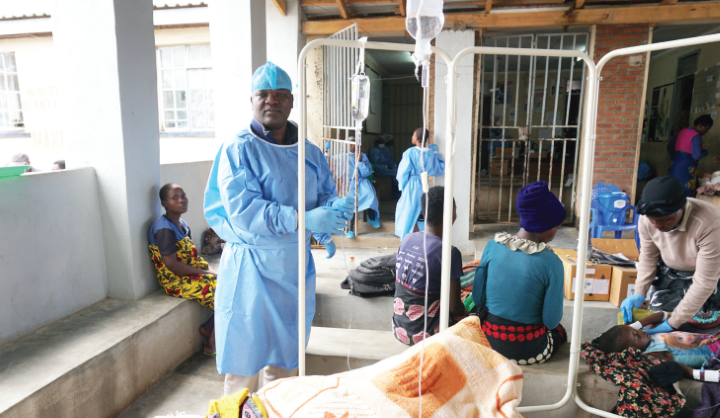Wonders of volunteerism in HIV fight
 She saw her husband ill and dying. Then her year-old son, too, joined the fray. It was a twin sickness that brought her tremendous suffering.
She saw her husband ill and dying. Then her year-old son, too, joined the fray. It was a twin sickness that brought her tremendous suffering.
This was in 2003—the year when between 38 000 and 120 000 people in Malawi were dying of HIV and Aids in closed doors, when the prevalence rate stood at a record 15 percent.
But Edith Kachulu from Chikolosa Village, Traditional Authority (T/A) Kanduku, Mwanza, defied the odds. Dazed after her husband turned down her proposal to go for testing, she went to Mwanza District Hospital. Although she was not sick, she went for testing and was diagnosed HIV positive.
She was counselled, but the news was still too much for her to bear. She disclosed her status to her husband, but she did not have the courage to go public, fearing stigma. The husband, still living in denial, insisted he could not go for testing. He died that year.
But it was the death of her son, later on in the same year, that became Kachulu’s turning point. The boy was her last born. She has three others. With the death of their breadwinner, she had no one to help her take care of the children.
“I was encouraged to be open to people about my situation. If I don’t, the counsellors said I would live in denial and die quickly. This counsel made me think about my children’s future. I asked myself: Who is going to care for them?” she says.
Red Cross was already in her area running an HIV-related programme. Basically, the programme encouraged people to go for testing and counselling, declare their status and enrol for life-prolonging drugs.
In October, Kachulu gathered her courage and knocked at the doors of Red Cross offices at Mwanza Boma. According to Red Cross programme manager for Mwanza, Leonard Mwanza, their records show Kachulu as the first woman in the district to declare her HIV status at his organisation.
Kachulu says declaring her status was important because it kept her from living in denial. But the real story behind her vibrancy, she says, lies in the spirit of volunteerism that developed in her.
“When I tested positive, I asked the counsellors: What should I do now? I asked those at Red Cross the same question. Luckily, they understood my concern. They taught me that I need to always be in company of others, to learn from and help each other,” she says.
She began to volunteer for Red Cross.
“I was the only one at first. I would go to different places with Red Cross officials, encouraging people to go for testings. Many people were inspired by my openness about my status. They understood that HIV and Aids is a disease like any other,” she says.
By the end of 2003, inspired by Kachulu, four women got tested and declared their status. Together, they started a volunteer support group.
“We would meet three times a week, travel across different villages encouraging people to go for testing. We would also discuss income-generating activities. Later on, Red Cross linked us to different financial lending institutions. They also provided training ranging from herbal medicine, home-based care and may other things,” she says.
Being a widow, Kachulu says her life has benefitted from volunteerism.
“I have met different people who have not just uplifted my spirits when I am down, but also helped me to start small-scale businesses which bring income at home,” she says.
Today, she is able to send all her children to school. Yet she is not the only one in Mwanza with such a story.
There are almost 45 volunteer support groups in Mwanza comprising a number of people eager to make a difference in the fight against HIV and Aids. Although they are coordinated by Red Cross, Dr Godwin Ulaya, Mwanza medical officer, spoke highly of them.
“Mwanza, being a border district, has a higher HIV prevalence rate. However, the community that is rising up against the epidemic.
“We have seen how volunteers are not just helping take care of those who are bedridden through home visits, but also spearheading messages of preventive measures such as condom use. This is interesting and, arguably, helping to scale down the prevalence rate and also HIV and Aids-related deaths,” he says.
So, should volunteerism among people living with the virus be considered a key aspect in the HIV and Aids fight in Malawi?
Safari Mbewe, executive director of Malawi Network of People Living with HIV (Manet+), says volunteerism and support groups create a platform for people with a common concern to meet, discuss and bargain for issues affecting them.
“It becomes an opportunity for those living with the virus to interact with others and learn something new. It opens them to issues such as capital for business, loans and scholarships,” he says.





